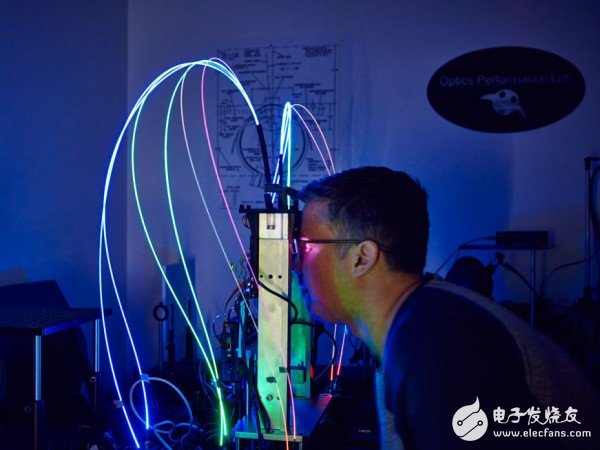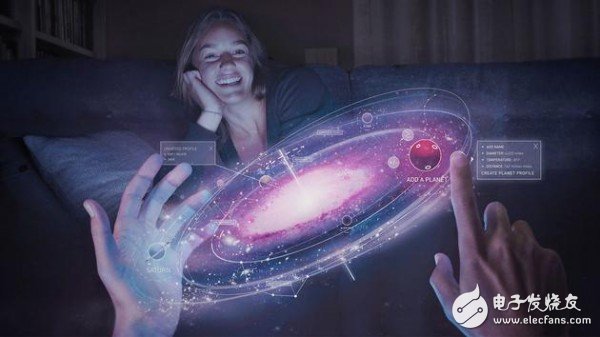The Bloomberg website said on Wednesday that companies such as Magic Leap and Microsoft are selling the concept of "Mixed Reality." The industry believes that this is because the concept of “reality enhancement†has been played badly, and these companies hope to attract attention through new concepts.

Magic Leap's "Mixed Reality" (MR) device
The following is the full text of the article:
Magic Leap Chief Innovation Officer Graeme Devine presented the company's long-term technical goals at the Games of Change FesTIval event last week. Magic Leap has always been a highly regarded company on how to make computer images look like real worlds. In recent years, this concept has begun to differentiate in two ways: the use of head-mounted devices, the replacement of real-world virtual reality technology with virtual worlds, and the reality enhancement technology of superimposing computer images on the real world.
In his speech, German talked about the third concept: mixed reality. The main difference between mixed reality and real-world enhancement seems to be that there is a flaw in reality enhancement, and mixed reality is even cooler. In the German speech process, some pictures show what users get when they search for the keyword "reality enhancement" through Google. This includes iPhone games that don't make much sense, and shoppers in the store use the mobile app to search for information. In the words of German, mixed reality is the dream of the future.
In fact, this concept is not new. Mixed reality emerged in the 1990s and is defined as all technologies between the real world and the digital world. Subsequently, the concept of mixed reality is often mixed with reality, and reality enhancement has gradually become a more common formulation. However, over the past year or so, Magic Leap and Microsoft are gradually emphasizing mixed reality to show that the products they develop are fundamentally different.
Some technical experts also believe that there is a difference between the two concepts, but the difference may not be large. One explanation is that reality enhancement superimposes translucent images on the basis of the real world, while mixed reality technology superimposes opaque images. Another argument is that the difference between reality enhancement and mixed reality is how virtual objects interact with the user and the real world. Thomas Malisiewicz, a deep learning engineer at Magic Leap, recently said that mixed reality combines real-world enhancements with virtual reality and adds new elements to produce images that are convincing. He believes that this will be the "ultimate field."

"Mixed reality" image seen through Magic Leap glasses
In public, Magic Leap may never admit that its technology belongs to the realm of realm. However, the company has not yet unified its internal standards. Several of Magic Leap's employees, including lead engineers and engineering directors of computer vision, still call the company's technology a reality enhancement. In patent applications, Magic Leap acknowledges that these two concepts can be used interchangeably.
However, this is only the field of engineering development, not brand promotion. Reality enhancement is not a good concept when promoting innovative technologies, because it has been proposed for a long time. As early as 2010, the reality enhancement was listed as the "10 major technology trends" of Time.
Shawn Cheng of Vayner Capital pointed out that the association with common things has a negative impact on the concept of real-life enhancement, limiting users' imagination and expectation of this technology. In addition, reality enhancement technology is often considered to be closely related to Google Glass, and after the launch of the 2013 development version, Google Glass has not been successful.
Philip Ryan, assistant partner of the brand consultancy Vivaldi Partners Group, said: "I think Microsoft and Magic Leap are trying to differentiate themselves from Google Glass." Tom Sepenski, another brand company, Landor Associates (Tom Sepanski) said: "The information they are trying to convey is that 'mixed reality is completely different.'" He believes that mixed-English words are more intuitive and easier to remember, while still full of technological sense.
Magic Leap's recent enthusiasm for the concept of "mixed reality" is not the first attempt to break the "reality enhancement" concept. The company originally called the product "cinema-level reality." When HoloLens was released in January 2015, Microsoft directly bypassed the concept of real-life enhancement. Gartner analyst Brian Blau said that people initially referred to HoloLens as a reality enhancement, but Microsoft insisted that such a statement was wrong. Microsoft believes that HoloLens "will be a more exciting product, an upgrade to the reality."
There are currently no such products available for sale. Ryan said that it is stupid to be entangled in the name of the technology without anyone's concern, and the user will eventually decide what the technology is called. He said: "At present, only engineers are talking to themselves."
We have experience and skill to support customers to tooling for their required waterproof Connectors, like IP68 series,micro fit connectors. Etop wire assemblies for various industries have been highly recognized by all the customers and widely used for automobiles, electrical and mechanical, medical industry and electrical equipemnts, etc. Products like, wire harness for car audio, power seat, rear-view mirror, POS ATM, Diesel valve Cover gasket fit, elevator, game machine, medical equipment, computer, etc.
Connectors
JST Connector,Molex Connector, Multi-Contact Connector, Micro Fit Connectors
ETOP WIREHARNESS LIMITED , https://www.etopwireharness.com